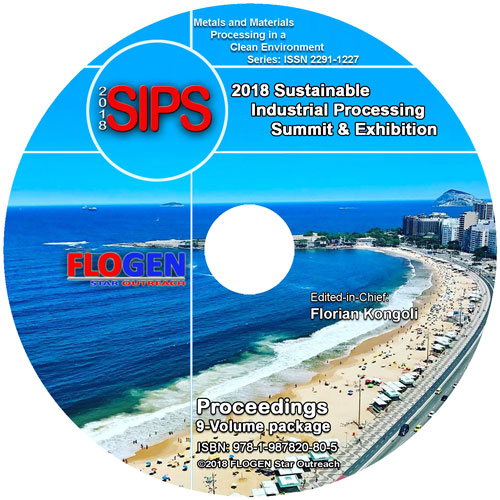2018-Sustainable Industrial Processing Summit
SIPS2018 Volume 3. Fehrmann Intl. Symp. / Molten Salt and Ionic Liquid
| Editors: | F. Kongoli, M. Haumann, P. Wasserscheid, T. Welton, M. Gaune-Escard, A. Angell, A. Riisager |
| Publisher: | Flogen Star OUTREACH |
| Publication Year: | 2018 |
| Pages: | 154 pages |
| ISBN: | 978-1-987820-86-7 |
| ISSN: | 2291-1227 (Metals and Materials Processing in a Clean Environment Series) |

CD shopping page
Perspectives on the Role of Transformative Materials and Technologies in Energy, Environment and Sustainability
Fernand Marquis1;1SAN DIEGO STATE UNIVERSITY, San Diego, United States;
Type of Paper: General Plenary
Id Paper: 427
Topic: 46
Abstract:
Sustainable development is a comprehensive and complex system of systems requiring multidisciplinary and interdisciplinary science and technology inputs with economic, environmental and social objectives. The trade space is very wide, and the multitude of trade-offs generate considerable challenges and make it often difficult to achieve an effective balance. During the last sixty years the planet's population has grown exponentially, from 2.5 to 7.5 billion people, and the technological progress achieved has been tremendous, especially in the industrialized countries. These trends are expected to continue, even at faster rates. All these associated technological activities in the pursuit of better living standards have created a considerable depletion of resources and pollution of land, water and air. Thus, and because most of our resources are limited, it is imperative that we achieve more with less. In broad terms, sustainable development is achieved when the present needs and challenges are met without placing in jeopardy the ability of future generations to meet their own needs and challenges. The global energy demand is expected to increase exponentially, associated with the increase in the global population. The three main reserves of fossil fuels: oil, natural gas and coal are decreasing very rapidly and will not always be available to meet the global demands soon. The continuation of fossil fuel emissions will be environmentally deleterious, and there is already a need to remediate some of the deleterious effects already sustained by the environment. Energy security has become a major and critical issue as fossil fuels are confined to a few areas in the world and their availability is controlled by political, economic and ecological factors. This means that in a short term, considerable energy efficiencies and savings must be achieved, and alternative and renewable sources of energy must be developed. To enable all these technologies considerable advances in energy storage and conversion materials and technologies such as batteries, super capacitors and fuel cells must be achieved. The transportation industry has by far the largest share of global oil consumption and is now the major producer of global greenhouse gas emissions in most industrialized countries. Mobility projections show that it is expected to triple by 2050 with associated energy use and environmental impact. Considerable achievements have recently been obtained in the development of new and advanced materials and technologies such as light weight metallic alloys, metal matrix composites, intermetallics, carbon fiber composites and hybrid materials. Nano, nano-structured and nano-hybrid materials systems and nanotechnologies have also been deployed with considerable impact. In addition, component design using a materials and functional systems integration approach is being used very effectively, resulting in considerable system improvements and energy efficiencies. This resulted in their introduction in the energy, transportation and manufacturing industries in a wide variety of devices and components with considerable technological, economic, environment and social impacts.